(Available in English below) Taalvaardigheid is een cruciale factor in studie- en beroepssucces. Wat kun je als vakdocent doen om taalvaardigheid van studenten te verbeteren? Studenten Liva Sadovska, Alicia Rottke Fitzpatrick en Noura Amer delen hun ervaringen over Engelstalig onderwijs. Lees ook meer over het belang van taalvaardigheid in het eerste artikel in deze reeks.
Wat is het Engelse woord voor vurenhout? De docent van de Willem de Kooning Academie kende de vertaling niet, dus de kwestie bleef onopgelost. Een klein voorval, dat voor internationale studenten de dagelijkse hindernisbaan illustreert bij hun studie Spatial Design. “Ik heb Google Translate altijd openstaan op mijn telefoon”, zegt Liva Sadovska. Hun opleiding heeft inmiddels diverse verbeteringen doorgevoerd.
Liva Sadovska, Alicia Rottke Fitzpatrick en Noura Amer zijn tweedejaars studenten Spatial Design aan de Willem de Kooning Academie. Vanuit hun geboortelanden Letland, Ierland en Duitsland kozen ze doelbewust voor dit ‘full English program’ in Rotterdam. Hun verwachtingen waren hooggespannen: prachtige folders, een uitdagende studie en een volledig Engelstalig aanbod. Maar al bij de inschrijvingen liepen ze vast: de formulieren en de andere communicatie waren allemaal in het Nederlands.
Veiligheidsinstructies
De studie is weliswaar volledig Engelstalig, maar de andere communicatie van Hogeschool Rotterdam verloopt vaak uitsluitend in het Nederlands. De veiligheidsinstructies voor de machines in hun eigen gebouw: Nederlands. De aanduidingen van etenswaren in de cafetaria: Nederlands. De prijslijst voor aan te schaffen materialen: Nederlands. “Gelukkig weet ik hoe de meeste machines werken, maar dit is niet goed voor onze veiligheid”, zegt Alicia. “En als we een allergie zouden hebben, is het handig om de ingrediënten te kunnen lezen in de cafetaria.”
Nog een hindernis: boeken vinden in de bibliotheek, ook als het om Engelstalige boeken gaat. Het zoeksysteem werkt uitsluitend met Nederlandstalige tags. “Allerlei diensten kunnen we niet gebruiken door de taalbarrière, ”, zegt Liva. “De studie vind ik fascinerend en past echt bij mij. Maar ik voel een grens tussen ons en de andere studenten, waardoor ik me vaak buitengesloten voel.”
Plamuur
De meeste docenten van hun opleiding spreken prima Engels, vinden ze. Op hun woordenschat hebben ze weinig aan te merken, al zijn er uitzonderingen. Maar ook hier missen ze veel. De grapjes: in het Nederlands. Technische termen en handelsnamen: meestal eveneens in het Nederlands.
Soms helpen andere studenten om het te vertalen. Zo weet Noura nu de betekenis van de zin ‘Ga naar de Praxis om plamuur te halen’. “Maar de docenten zijn verantwoordelijk, niet onze mede-studenten.”
Interactie met peers
Wat hen het meest dwarszit zijn de groepsdiscussies. Hun (vooral Nederlandstalige) studiegenoten mogen hun presentaties in het Nederlands houden. Daardoor missen de internationale studenten de kans om van hun peers te leren en te reflecteren op elkaars leerproces. “We betalen hiervoor, maar we krijgen niet de bijbehorende service”, vindt Noura. “We moesten wel naar iedereen blijven luisteren, maar de discussie achteraf missen we helemaal. Erg jammer, want we zijn hier juist voor de interactie.”
Het drietal steekt er veel eigen tijd in om toch hun eigen weg te vinden op de hogeschool, stukken tekst zelf te vertalen en praktische oplossingen te zoeken. Google Translate is hun beste vriend. “Maar ik gebruik die tijd liever om aan mijn design te werken”, zegt Liva.
Vooruitstrevend
Afgezien van de taalobstakels zijn ze superblij met hun studie. Alicia: “In Dublin is het kunstonderwijs heel traditioneel en zijn de faciliteiten heel mager. Ze hebben daar nog geen twintig procent van de machines staan die we hier hebben. Deze opleiding is veel vooruitstrevender dan de studie in mijn eigen land. We krijgen veel vrijheid om te experimenteren.”
Noura: “Soms vroeg ik me af of het wel de moeite waard was om te blijven met al die taalproblemen. Maar ik ben vastbesloten om dit helemaal af te ronden. We zijn echt betrokken, want we geloven in deze studie.”
Aanbevelingen
De docent met wie ze hun klachten deelden was verrast en beloofde verbetering. Die aanpassingen zijn inmiddels zichtbaar in de opleiding. De communicatie op hogeschool-niveau laat in hun ogen nog steeds veel te wensen over. Hun eerste aanbeveling is daarom duidelijk: alle communicatie moet in het Nederlands én in het Engels beschikbaar zijn.
Hun allergrootste wens ligt echter op een ander vlak: ze willen heel graag via de hogeschool Nederlands leren. “Als je hier vier jaar gestudeerd hebt, is het raar als je alleen wat losse Nederlandse woordjes hebt opgepikt”, vindt Noura. “We willen dit alle drie echt graag leren, maar we hebben op de hele hogeschool geen enkel aanbod gevonden.”
Om te peilen hoe andere internationals daarover denken, hield Noura een petitie op Facebook. Ze kreeg meer dan veertig reacties van studenten die haar wens delen. Zelf kan ze niet wachten om hiermee te beginnen. Fijn, want dan kan ze voortaan ‘vurenhout’ naar haar moedertaal vertalen.
Estafettevraag
Dit is het tweede artikel in een reeks over taalvaardigheid. Iedere deelnemer stelt in deze serie een vraag aan de volgende deelnemer. Docent Kirsten van den Heuij stelde in de eerste aflevering deze vraag die zij beantwoord wilde zien door een student: “Wat kan de docent doen om jouw taalvaardigheden te verbeteren?”
Noura Amer: “Diverse docenten op internationale opleidingen gebruiken powerpoints die in het Nederlands geschreven zijn. Vertaal deze presentaties in Engels. Het grootste deel is al geschreven, dus dit is heel simpel te realiseren. Dan missen wij als Engelstalige studenten geen aanknopingspunten meer.”
Dit is de vraag van Noura aan een docent:
“Hoe kunt u als docent de communicatie verbeteren tussen de staf en de studenten?”
Op de foto: vlnr Alicia, Liva en Noura.
International students: ‘Always have Google Translate at hand’
Language skills are crucial for study success and in one’s professional career. What can lecturers do to improve the students’ language skills? Students Liva Sadovska, Alicia Rottke Fitzpatrick and Noura Amer share their experiences with English-taught education.
What is ‘vurenhout’ in English? A lecturer at Willem de Kooning Academy did not know the correct translation right away, so the question remained unanswered. Just a small matter, but for the international students an illustration of daily struggles at their study programme Spatial Design. “I constantly use Google Translate on my phone”, says Liva Sadovska.
Liva Sadovska, Alicia Rottke Fitzpatrick and Noura Amer are second-year students Spatial Design at the Willem de Kooning Academy. From their birth countries (Latvia, Ireland and Germany), they all consciously chose this ‘full English programme’ in Rotterdam. Their expectations were running high: beautiful brochures, a challenging study programme and a completely English-language stream. But when registering, they got stuck: the forms and other communication was all in Dutch.
Safety Instructions
The courses of the study programme may be completely English taught, but the other communication at Rotterdam University of Applied Sciences is often only in Dutch. The safety instructions for the machines in their own building: in Dutch. The food labelling in the canteen: in Dutch. The list of prices for materials they needed: in Dutch. “Thankfully I know how most of the machines work, but it is not ideal for our safety”, says Alicia. “And if we did have a food allergy, it would be handy to be able to read the ingredients of the food that’s available in the canteen.”
Another obstacle: finding books in the library, even books in English. The search system works exclusively with Dutch tags. “Many of the services are simply unavailable to us due to the language barrier”, says Liva. “The studies are fascinating and perfect for me. Still, we feel there’s a barrier between us and the native speakers. One can feel like an outsider at times.”
Filler
In their opinion, most lecturers of the study programme speak English quite well. Their vocabulary is not lacking, even though there are exceptions. They do miss information due to insufficient vocabulary. And of course the jokes are always in Dutch! Technical terminology and trade names: for the most part also in Dutch.
Sometimes other students help translate. Noura now knows the meaning of the sentence: ‘Ga naar de Praxis om plamuur te halen’ (Get your filler, or putty, at the Praxis hardware shop). “But the lecturers are end-responsible, not our fellow students.”
Interaction with peers
Group discussions is what bothers them the most. Their (mostly Dutch) classmates are allowed to hold their presentations in Dutch. As a result the international students miss the opportunity to learn from their peers and to reflect on each other’s learning process. “We pay for our education, but we are not receiving the appropriate service”, according to Noura. “We had to listen to everyone, but could not understand the discussion after the presentations which were held in Dutch. Too bad, because we are here especially for that interaction.” The three of them invest much time in getting acquainted with the university of applied sciences by translating texts themselves and looking for practical solutions. Google Translate is their best friend. “But I would rather use that time to work on my designs”, says Liva.
Progressive
Other than the language barriers, they are very satisfied with their study programme. Alicia: “In Dublin art education is very traditional and facilities are hardly available. They have less than twenty % of the machinery available compared to what we can use here. This study programme is much more progressive than the one in my country. We are given quite a bit of freedom to experiment.”
Noura: “Sometimes I wondered if it was worth staying here despite the language problems. But I am determined to finish my studies. We are really committed, and we believe in the study programme.”
Recommendations
The lecturer with whom they shared their complaints was surprised and promised improvements. By now it is clear that those changes have been made at the study programme. Communication at the level of the university of applied sciences leaves much to be desired. Their first recommendation is clear: all communication should be in Dutch and in English.
Their biggest wish, however, is something else altogether: they are motivated to learn Dutch as part of their studies. “If you have been studying here for four years, it’s weird that you would only know a few random words of Dutch”, according to Noura. “All three of us want to learn Dutch, but we have found no possible courses for us within the school system.”
In order to find out how other international students feel about that, they started a petition on Facebook. They got over forty student reactions sharing that same aspiration. She herself cannot wait to get started. Great! Because then she can finally translate ‘vurenhout’ to her native language.
Relay question
This is the second article about language skills. Every participant in this series asks the next participant a question. In the first article, lecturer Kirsten van den Heuij asked the following question for a student to answer: “What can the lecturer do to help improve your language skills?”
Noura Amer: “Several lecturers at international study programmes use PowerPoint presentations written in Dutch. Translate these presentations into English. Much of it is already written, so it is an easy task to realise. Then we English-speaking students will no longer miss any references.”
This is Noura’s question to the lecturers:
“How can you improve communication between the staff and the students?”
In the picture: from left to right Alicia, Liva en Noura.
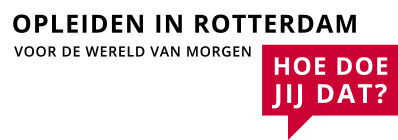
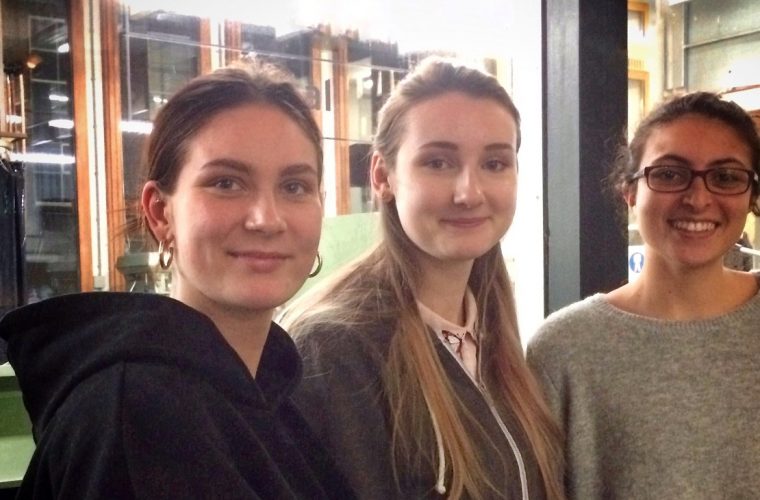
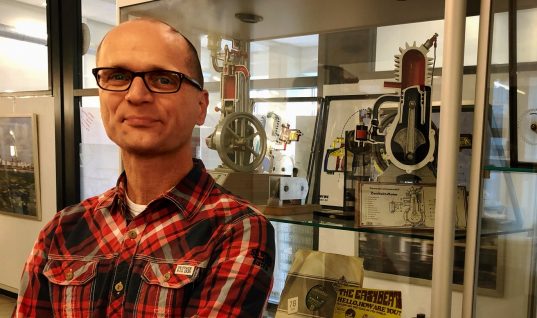
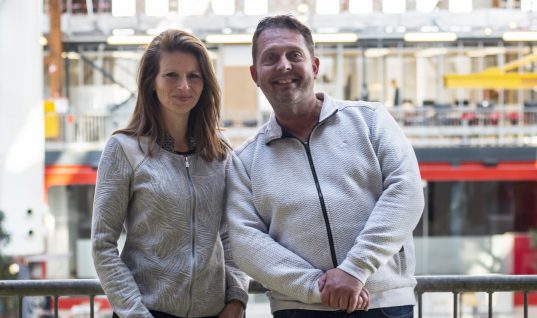
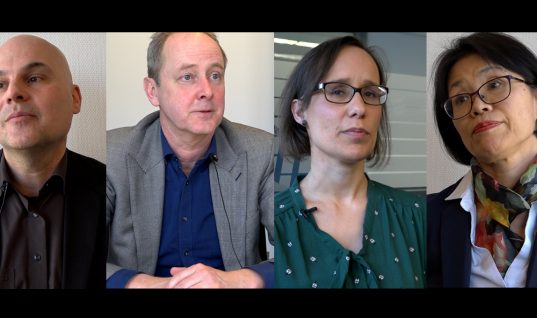

René Oostdijk
As for the library catalogue system: the Dutch-language tags are indeed a limitation. The library staff is aware of this. However, we are currently working on a solution. Next academic year (2019-2020), if all goes well, we will have migrated to the WorldCat Discovery system. This cooperative, cloud-based cataloguing system allows for better, richer descriptions in multiple languages. For example see https://hogeschoolrotterdam.on.worldcat.org/oclc/746140753
So yes, the system is actually already in use. However, just for our digital collection (e-books, articles). The hardcopy books you find here are just uploaded periodically and do not reflect the actual collection. This will change once the migration has completed. As for our other serviced, you can visit our English language site at https://rotterdamuas.com/library